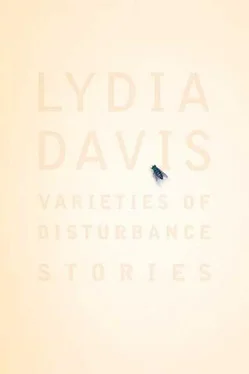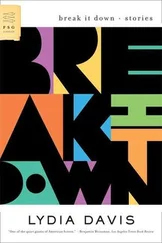One girl, Susan B., in one of the briefer letters (three lines, three sentences), expresses only the common sentiments and then adds the wistful secondhand report: “Jonathan A. told me that he send [ sic ] you a big box of candy.” Her handwriting changes noticeably in the latter part of this sentence: dark, upright, and confident at the start of her letter, the words become increasingly faint and slant more and more to the right until the word candy , thin and delicate, is lying almost on its side.
Experience in Hospital/Food
Only a few children express curiosity about Stephen’s experience in the hospital.
Kingsley asks: “Do you like it at the hospital?”
Stephen’s good friend Jonathan, too, is interested: “How is it up there?”
Stephen’s next-door neighbor, Carol, is more specific: “Do you have good meals there?”
Billy T. is also concerned about Stephen’s food, presumably in the hospital, although his use of the future tense makes this somewhat unclear: “I hope you will eat well.”
Arlene, who was evidently not sure how to spell her own name, or perhaps chose to decorate it with the added i , brings a tone of urgency or even peremptoriness to her letter, with her two brief but exact questions: “Who is your nurse? Who is your doctor?” We understand, however, when we come to the last sentence in her letter, that her interest may be “professional”: “I got a nurse kit for Christmas.”
Empathy: I Know How It Feels
Scott opens with a display of empathy—“I know how it feels over there”—before threatening to visit Stephen.
Joseph O. also opens with what seems to be generous empathy: “I know how you feel.” But he then continues with an apparent non-sequitur: “I am going to get a new coat with a hood.”
News
Weather
A few children mention the weather.
Joseph A. says, laconically or reasonably: “The temperature keeps on changing.”
Cynthia, who has a good understanding of the importance of accuracy and detail (see below), writes: “It’s very icey [ sic ] out today.”
Another girl, Susan A., is more poetical about the weather, deploying the only metaphor in the entire sample of letters. Although the metaphor is a hackneyed one, she immediately afterward improves on it with a more powerful realistic description: “A week ago we had a sleet storm. When it was over everything looked like a fairyland but some trees were bent and broken.” Her ultimately matter-of-fact and realistic approach to her surroundings is reflected in handwriting that is quite regular, except for some tremulous lines in the taller letters.
Eating/Food
Aside from the two mentions of eating in relation to Stephen’s hospital experience, the only mentions of food are the two references to Jonathan’s gift of the box of candy, one by Jonathan himself (“I hope you liked my box of candy”) and the other by the perhaps envious Susan B.
School/Schoolwork
Aside from the commonly expressed wish that Stephen would return to school soon, school and schoolwork are not mentioned by many of the students, perhaps because they are sitting in school as they write.
Diane is the only student to mention a textbook: “We are reading in Singing Wheels.” We may even posit, on the basis of her exceptional interest in this text, along with her subsequent mention of receiving a Victrola for Christmas, implying an interest in music, together with her inconsistent handwriting (letters sometimes slanted and sometimes upright, sometimes sinking below the line, etc.), that Diane is rather intellectually and artistically inclined, and “creative.” At the same time, given her inclusion of her siblings in her letter (see below), as well as her friendship with Mary, and Mary’s mention of their skiing, she appears to be outgoing, sociable, family-oriented, and physically active.
The above-mentioned friend, Mary K., after she describes skiing with Diane, closes her letter: “Well we are starting reading now so I will have to say, ‘Good-by.’” (The teacher, although she inserted the hyphen in “Good-by,” has not supplied the missing comma after “Well.”) Mary is the only one to evoke the classroom at the moment the children are writing, by mentioning an imminent classroom activity. She evidently shares Diane’s interest in, or enjoyment of, the class’s activity of reading.
A third mention of school, but in the most general terms, is the bland remark by Maureen quoted earlier: “I like school very much.” As we observed earlier, however, Maureen may not like school as much as she says she does.
A fourth girl, Lois, mentions another area of study, perhaps one that interests her more than reading: “We are still on tables.” She precedes this, however, by the disclaimer: “We are not doing very much work.” (It should be pointed out that despite the evident care with which the teacher has conducted this exercise, two students comment that they are “not doing much/not doing very much work.” This is either true or, more likely, merely the perception of these particular students, who may, if such is the case, be either brighter and quicker to finish their work than some of the others or simply less interested. Whatever the case, the teacher has allowed these remarks to stand.)
Shopping with Parent
The children go downtown to shop, they shop for winter clothes, and they go with their mothers.
Fred writes: “My Mother and I are going down town to get a stormcoat. My Sister is going to get a new skisuit and a hat.” This is the entire content of the letter, aside from his closing sentence: “Well I guess this is all I have to tell you.” (Again, the teacher has failed to supply the missing comma after “Well.”)
Playing in Snow
The children are generally more expressive about their play in the snow than any other subject, sometimes providing place-names and other details.
Alex writes: “We had some fun over at Hospital Hill. We went over a big bump and went flying through the air. This year I went on a higher part than I used to.” His handwriting, perhaps in keeping with his sense of adventure, is inconsistent, the letters sometimes on the line and sometimes above or below it, the ink laid down sometimes in a thin, elegant stroke, sometimes a thick, awkward one.
Two boys describe fights. John W. writes, “There was a big snowball fight outside. Almost all of the groups were fighting.” Since any snowball fight would necessarily take place outside, his use of “outside” must be local and specific, indicating the school grounds, especially since only there would “almost all of the groups” be present. Stephen was evidently expected to know exactly who constituted “all of the groups.”
Theodore writes: “I had a snowball fight with some boys down at my house. I beat the boys who were against me.”
The realist Cynthia, not as combative as the boys, writes in firm dark ink, “I have been sliding once and I had fun. I have made snowmen but they have fallen down.” The consistent slope of her letters, her sensitive use of parallel structure, and her precision as to the frequency and results of her activities suggest that she may be a good student.
Mary K. is one of only two to mention another child by name: “Last Monday Diane T. and I went skiing. There is a small jump in the hill and we had a hard time jumping it.” Her somewhat stern “I hope you…will be back in school in a very short time,” in addition to the specificity of “small jump” and “hard time” may lead us to posit that she demands a fairly high standard of performance from herself as well as from others.
Janet adds an unexpected element: “I have been sledding and skiing and the cats go with me.” This may be one of the few instances, among the letters, of objectively interesting information. Before signing off, she notes, less interestingly, “They sleep with me, too.”
Читать дальше












